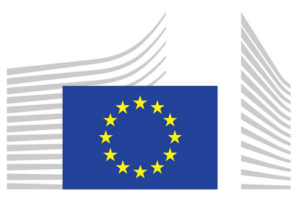Access to the official webpage and social networks
 |
 |
 |
 |
Role: Promotes the general interest of the EU by proposing and enforcing legislation as well as by implementing policies and the EU budget
Members: A team or ‘College’ of Commissioners, 1 from each EU country
President: Ursula von der Leyen
Year established: 1958
Location: Brussels (Belgium)
The European Commission is the EU’s politically independent executive arm. It is alone responsible for drawing up proposals for new European legislation, and it implements the decisions of the European Parliament and the Council of the EU.
What does the Commission do?
Proposes new laws
The Commission is the sole EU institution tabling laws for adoption by the Parliament and the Council that:
- protect the interests of the EU and its citizens on issues that can’t be dealt with effectively at national level
- get technical details right by consulting experts and the public
Manages EU policies & allocates EU funding
- sets EU spending priorities, together with the Council and Parliament
- draws up annual budgets for approval by the Parliament and Council
- supervises how the money is spent, under scrutiny by the Court of Auditors
Enforces EU law
- together with the Court of Justice, ensures that EU law is properly applied in all the member countries
Represents the EU internationally
- speaks on behalf of all EU countries in international bodies, in particular in areas of trade policy and humanitarian aid
- negotiates international agreements for the EU
Composition
Political leadership is provided by a team of 27 Commissioners (one from each EU country) – led by the Commission President, who decides who is responsible for which policy area.
The College of Commissioners is composed of the President of the Commission, eight Vice-Presidents, including three Executive Vice-Presidents, the High Representative of the Union for Foreign Affairs and Security Policy, and 18 Commissioners, each responsible for a portfolio.
The day-to-day running of Commission business is performed by its staff (lawyers, economists, etc.), organised into departments known as Directorates-General (DGs), each responsible for a specific policy area.
Appointing the President
The candidate is put forward by national leaders in the European Council, taking account of the results of the European Parliament elections. He or she needs the support of a majority of members of the European Parliament in order to be elected.
Selecting the team
The Presidential candidate selects potential Vice-Presidents and Commissioners based on suggestions from the EU countries. The list of nominees has to be approved by national leaders in the European Council.
Each nominee appears before the European Parliament to explain their vision and answer questions. Parliament then votes on whether to accept the nominees as a team. Finally, they are appointed by the European Council, by a qualified majority.
The current Commission’s term of office runs until 31 October 2024.
How does the Commission work?
Strategic planning
The President defines the policy direction for the Commission, which enables the Commissioners together to decide strategic objectives, and produce the annual work programme.
Collective decision making
Decisions are taken based on collective responsibility. All Commissioners are equal in the decision-making process and equally accountable for these decisions. They do not have any individual decision-making powers, except when authorized in certain situations.
The Vice-Presidents act on behalf of the President and coordinate work in their area of responsibility, together with several Commissioners. Priority projects are defined to help ensure that the College works together in a close and flexible manner.
Commissioners support Vice-Presidents in submitting proposals to the College. In general, decisions are made by consensus, but votes can also take place. In this case, decisions are taken by simple majority, where every Commissioner has one vote.
The relevant Directorate-General (headed by a Director-General, answerable to the relevant Commissioner) then takes up the subject. This is usually done in the form of draft legislative proposals.
These are then resubmitted to the Commissioners for adoption at their weekly meeting, after which they become official, and are sent to the Council and the Parliament for the next stage in the EU legislative process.







Leave a Reply